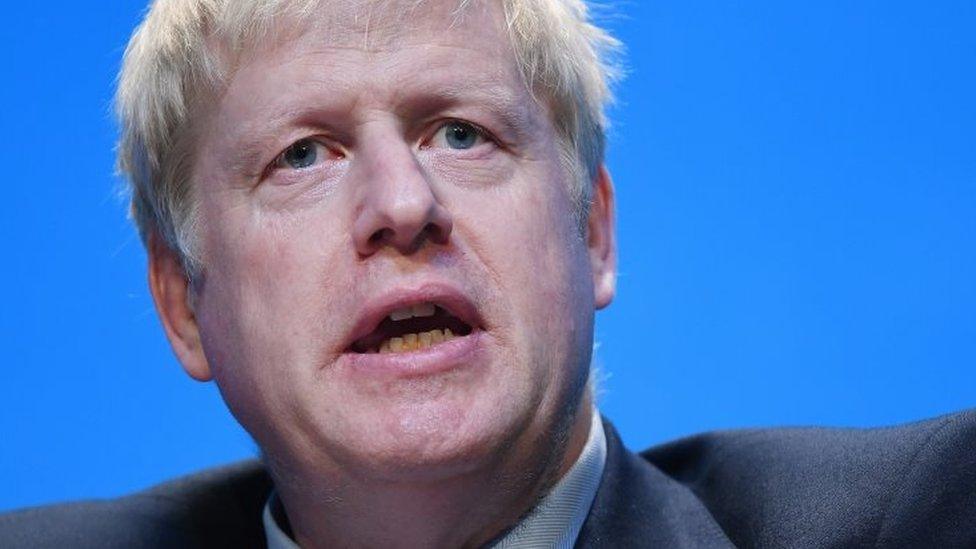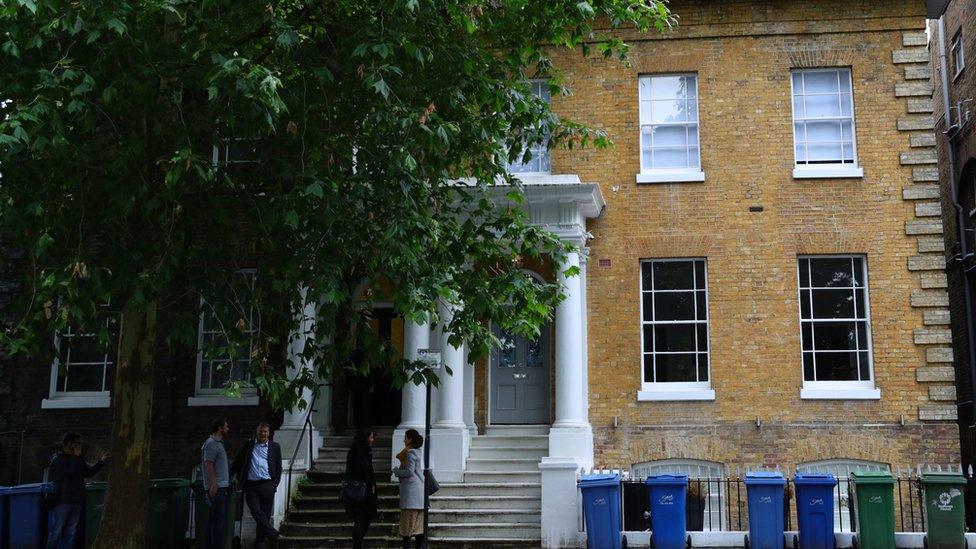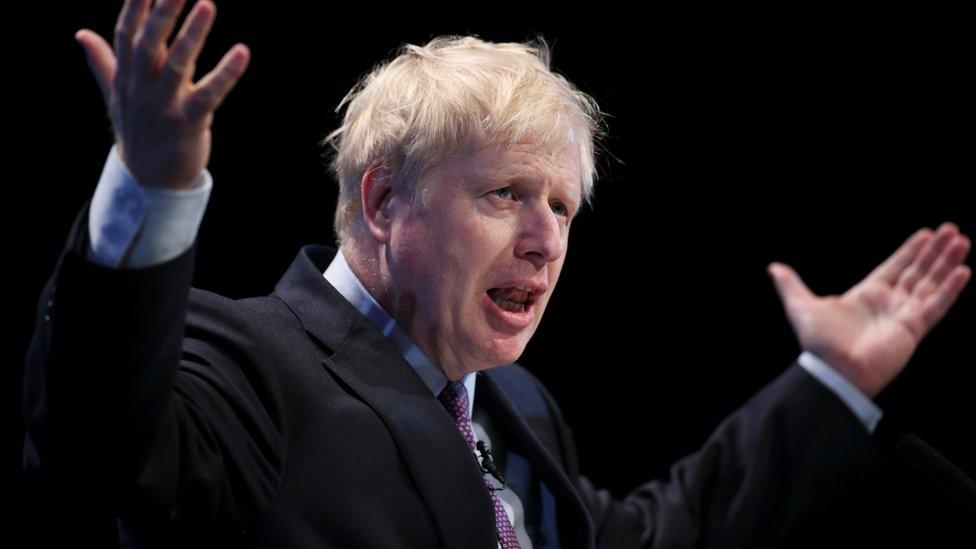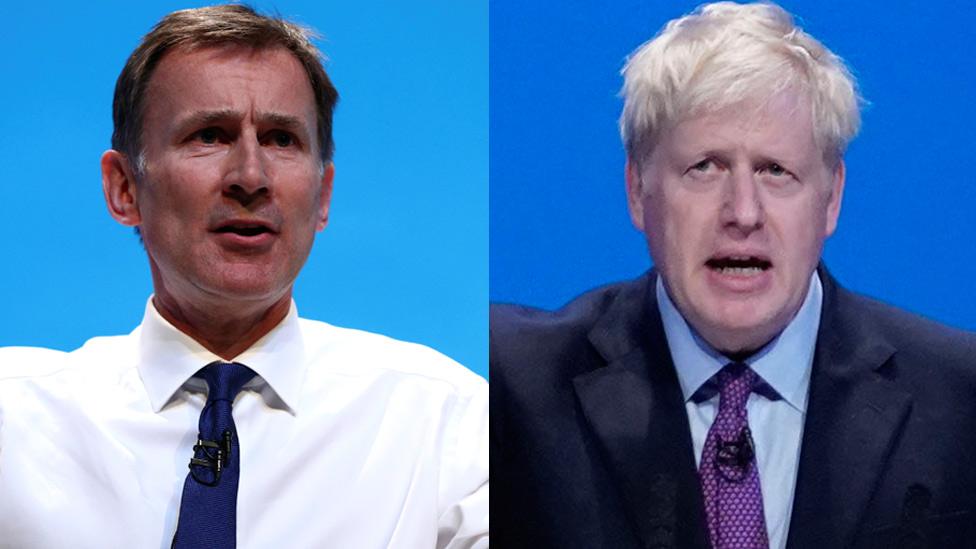Tory leadership race: Boris Johnson 'ducking important questions'
- Published
Jeremy Hunt accuses Boris Johnson of "ducking very important questions"
Jeremy Hunt has accused Tory leadership rival Boris Johnson of "ducking" scrutiny, saying a would-be PM "should answer questions on everything".
However, Mr Hunt said people "don't want a big debate" about politicians' private lives after several Tories urged Mr Johnson to address questions about a row with his girlfriend.
Cabinet minister Liam Fox said it was better to explain what happened than allow it to become a "distraction".
Mr Johnson has refused to comment.
The leadership frontrunner dodged questions on the issue on Saturday at a Conservative Party hustings held as part of the contest to replace Theresa May as leader and ultimately prime minister.
It comes after a neighbour called police and recorded a heated row at the home Mr Johnson shares with his partner, Carrie Symonds, in Camberwell, south London.
Defending his actions, neighbour Tom Penn told the Guardian, external he had been worried about his neighbours' safety, adding: "I hope that anybody would have done the same thing."
He said he began recording from inside his flat, after he heard "slamming and banging" in the early hours of Friday.
In the recording - heard by the Guardian, but not by the BBC - Ms Symonds could reportedly be heard telling the Tory MP to "get off me" and "get out of my flat".
Liam Fox on Boris: 'It's always easier to just give an explanation'
Asked about the issue, Mr Hunt told Sky News: "I think someone who wants to be PM should answer questions on everything, but I'm not going to comment on character."
But the foreign secretary also said he thought the story about Mr Johnson's row with his girlfriend was "irrelevant to the leadership debate" because the country was in "such a serious situation" over Brexit.
"What happens in people's personal lives is really a matter for them.
"What people care about is who is going to be the wise prime minister who navigates this country out of the biggest constitutional crisis in our lifetimes."
Later, to the BBC, he repeated his calls for Mr Johnson to debate live with him on television, and accused him of "not answering" the "difficult" questions about Brexit.

The comments came after International Trade Secretary Mr Fox - a backer of Mr Hunt - told the BBC's Andrew Marr Show that it was "always easier to just give an explanation" about what had happened.
"The key thing is then how you get on to the issues," he said.
"What we can't have is it being a distraction from explanations about wider policy."
He said it was "fair" for candidates to be asked questions about their character, but added: "I'm not sure what we've seen over the last few days is a fair reflection of that."
But Mr Fox dismissed suggestions that Mr Johnson's private life made him a potential security risk.
Recalling Mr Johnson's previous role in government, he said: "Do you think Theresa May would make him foreign secretary if there were genuine worries about him being a security risk?"
"I think we have to get away from these distractions and talk about policy issues."
Meanwhile, speaking to John Pienaar on BBC Radio 5 Live, Chief Secretary to the Treasury Liz Truss said Mr Johnson had a proven record, so "people know what he's like in office".

Carrie Symonds has been in a relationship with Mr Johnson since 2018

Asked about the row, she said: "There's no point asking me. I believe it's a private matter - I don't think the public are concerned about that.
"Boris served for eight years as mayor of London, did a brilliant job; he's served as foreign secretary - people know what he's like in office, and that's what's important."
But shadow communities secretary Andrew Gwynne said Mr Johnson was "completely unsuitable" to be prime minister.
Speaking on Sky News, he said: "In one sense, of course, it is a private matter, but when you're running for public office, when you are wanting to be the prime minister of the UK, then these matters are in the public interest.
"I've long held the view that Boris Johnson is unsuitable to be prime minister of this country."

Police were called to Ms Symond's Camberwell flat
On Saturday, Mr Johnson repeatedly avoided questions about the incident as he and Mr Hunt made their pitches to Tory party members on why they should succeed Mrs May as prime minister.
When the event moderator, Iain Dale, accused him of ducking the question, Mr Johnson did not respond directly, instead saying: "People are entitled to ask me what I want to do for the country."
Mr Dale was heckled by some in the audience when he continued to press the MP, but Mr Johnson later defended his persistence.
"There will have been lots of other people in the audience who didn't boo, and who actually did want to hear the answer to that question," Mr Dale told the BBC.
It was the first of 16 events, or hustings, to choose the next Conservative party leader - and prime minister - following Mrs May's resignation after she failed to get her Brexit deal through Parliament.
She remains in office until her successor is found.
Conservative Party members will vote for their next leader after an initial list of 10 candidates to replace Mrs May was whittled down to Mr Hunt and Mr Johnson following a series of votes by Tory MPs.
Members will receive their ballots between 6 and 8 July, with the new leader expected to be announced in the week beginning 22 July.
Correction 24 June 2019: A previous version of this article stated Jeremy Hunt wanted Boris Johnson to answer questions about his private life, and was headlined to reflect this. It has been amended to make clear Mr Hunt's demands were for Mr Johnson to explain his policies in full.
- Published22 June 2019

- Published22 June 2019
